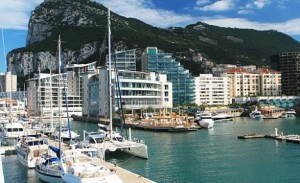
Spain's stringent border controls have escalated tensions with the UK in recent months
The European Commission has ruled that Spain did not break the law when it stepped up more stringent border checks with Gibraltar earlier in the summer.
In what has been a long-simmering source of conflict between Spain and Britain, Gibraltar residents and visitors were subjected to hours-long queues at the border over the summer, with intermittent slow-moving border crossings ever since…
The tighter border controls were prompted by what Spain felt was Gibraltar’s infringement on waters believed to be Spanish. In response, the Spanish government stepped up border controls, ostensibly to tighten up against potential smugglers.
As the queues lengthened and tempers frayed, the national media on both sides waded in, throwing insults at one another, while the diplomatic rhetoric via more official, political channels took on a decisively pointed tone.
The European Commission, in an attempt to diffuse the diplomatic frisson, sent a fact-finding monitoring group to the border in September. The results of its findings have just been released, with the Spanish government in Madrid said to be ‘satisfied’ with Brussels’ decision.
“The commission had not found evidence to conclude that the checks on persons and goods as operated by the Spanish authorities at the crossing point have infringed the relevant provisions of Union law,” read the official report.
However, the UK foreign office pointed to the fact that the report called the management of the border ‘challenging’, and that the commission still had ‘put Spain on notice’, meaning it will continue to monitor the situation in case Spain does, in fact, break the law in the future.
“We will continue to provide evidence of Spain’s unlawful behaviour to the commission,” said a British Foreign Office spokesman. “They’ve recognised that there is a problem with traffic flow and that Spain must reduce its random border checks.”
The report also laid out a series of recommendations to both parties, suggesting to Madrid to open up more crossing lanes than currently, and step up its ‘risk profiling’, thereby smoothing the passage of innocent travellers.
Meanwhile, the Commission called for Britain to improve its anti-smuggling activities in the Gibraltar Straits. Both sides were also urged to cooperate more closely on intelligence, sharing more information that could be potentially useful to the other nation.
The British government applauded these recommendations, adding: “We welcomed the commission’s commitment to hold the Spanish government to account by following up in six months and explicitly highlight the possibility of a future visit.”
 en
en



 Vlaams-Nederlands
Vlaams-Nederlands
0 Comments
Leave a Comment
DISCLAIMER
The opinions and comments expressed by contributors to this Blog are theirs alone and do not necessarily reflect the views of VIVA Homes Under the Sun Ltd, any of its associated companies, or employees; nor is VIVA to be held responsible or accountable for the accuracy of any of the information supplied.
Have you got something to say?